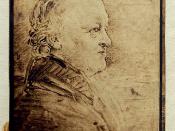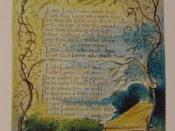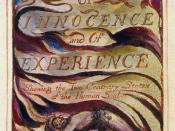A comparison of Blake's treatment of his subject in "Songs of Innocence" with that in "Songs of Experience".
William Blake is a poet of the Pre-Romantic era. He is one of the poets who set the path for Romanticism, where poets emphasized on emotions, they believed in the power of imagination and experimented with new ideas and concepts. Blake was a mystical poet and he felt that he was in communion with supernatural powers and with God.
The Songs of Innocence and the Songs of Experience, a series of lyrics, were first published as a combined volume in 1794, although the Songs of Innocence were first written in 1789, and the Songs of Experience in 1793-'94.
The "Songs" are a set of thematically related lyrics organised by a general principle of wishing to show the juxtaposition between the state of Innocence (seen from the eyes of youth) and that of Experience (seen from an adult perspective).
There are two aspects of Blake as a poet; one being the simplicity, depth of meaning and profundity as seen in the Songs of Innocence. In the Songs of Innocence, there is an idealistic point of view. They are poems, which have hope in life, and the world is seen from the eyes of a child. These poems emphasise on naïve world, unexposed to the evils and corruption. There is a feeling that ' God is in heaven, all is well in the world.' The mood in these poems is cheerful, joyous and bright. The second aspect deals with the disillusionment in human life. In the Songs of Experience, a great deal of emphasis is laid on social criticism, world-weariness, and combination of energy and violence. The mood in these poems is that of fear and instability.
Blake's own summary description of the Songs of Innocence and Experience, that they show "Two Contrary States of the Human Soul" offers perhaps the best way of approaching this thematically organised set of lyrics. "Innocence" and "Experience" are, for Blake, two complementary but also conflicting states of the human soul, and states within all of Creation: neither is "better" than the other, and both are necessary to the other.
In the Songs of Innocence, there is a sense of divine immediacy and love, that there is an all-pervading presence of God. This is seen in "The Lamb". This poem shows a tremendous sacrifice made on God's part for all mankind. It illustrates God's great love for mankind. "The Lamb" depicts the faith of a child; there is no doubt in the child's mind as compared to the perplexed speculations of an adult in "The Tiger". In "The Lamb" we can see the God of love and compassion whereas in "The Tiger" we see the God of experience, the God who is wrathful, who is not as benevolent as the God seen in the Songs of Innocence. Forces of fear, terror and destruction in the Songs of Experience replace the sense of security in the Songs of Innocence. The ferocity of the tiger is contrasted with the innocence of the lamb. The treatment of the subject matter and theme is simple in the Songs of Innocence and it is much more complex and sophisticated in the Songs of Experience.
In the Songs of Innocence there are occasional glimmers of the sorrows in life but there is no bitterness, anger and resentment as in the Songs of Experience. The "Chimney Sweeper" is an indictment of the society that exploits young children. In the poem the young boy is merely giving an account of the experiences in his life and has no anger for what he has gone through. The sorrow and misery, which the young boy and many other chimney- sweepers have been through is overshadowed by the hope of a beautiful life awaiting them in the future. This depicts the sense of optimism and also portrays the fact that it takes only a little to appease the young chimney sweeps.
The poems in the Songs of Experience concentrate on the darker and gloomier side of life. Blake makes use of irony, satire and cynicism to depict this dull side of life. Blake's portrayal of London in his poem "London" focuses on sorrow, cruelty, subjugation and exploitation. It shows society battening on other individuals and the tyranny of the church and state. The Songs of Experience emphasise on hypocrisy, repression, oppression and the sordidness of society. Blake criticises psychological indisposition, which accepts social injustice.
In the companion pieces "The Little Boy Lost" and "The Little Boy Found", Blake depicts how a young boy is looking for a father figure in his life, in the former poem and how God takes the place of the earthly father to compensate for the loss and suffering that the boy has been subjugated to. It shows how the boy is lost in the complexities of life and how he regains his innocence. We see that the young boy is returned to his family, unlike the girl in the poems in the Songs of Experience. It shows us that God will never desert us. Whereas, in the other two companion pieces, "The Little Girl Lost" and "The Little Girl Found" deals with the theme of mutability and of growing up. It depicts a girl experimenting with her life and wanting her own independence. The little girl is not returned to her family, she loses her innocence and she evolves into a woman.
In the Songs of Innocence , there seems to be a force which bonds all humanity. There appears to be a sense of fraternity and unity and a presence of divine or human love. This is seen in "On Another's Sorrow" where there is a feeling of brotherhood and that one never suffers alone. It shows that human beings are affected by the sorrow of other's. The poems in the Songs of Innocence envisage a world of sympathy, empathy and have a positive vision. Whereas, in the Songs of Experience, there is no unity and there is a cynical outlook towards life. There is a sense of superiority of one over the other. This is seen in the poem "London", where the church, which is meant to protect the interests of the people, collaborates with the state and engages in exploitive activities.
To conclude, Blake's Songs of Innocence and Experience epitomize the very crux of emotions, moods and thoughts, which are universal to us all, regardless of caste, creed or gender. It speaks volumes about the immortality of the human spirit and attitude as the same feelings are embodied within us even today, more than two hundred years since these poems were published.


